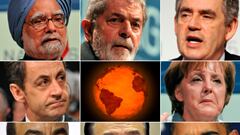
We have seen the future of international politics and it is Copenhagen. That future holds for monster issues like global warming as well as most bilateral negotiations. Too bad for all of us. The next decade portends at best small accomplishments in world diplomacy; at worst, stalemates festering into disasters, as well as torturous leadership days ahead for the United States, with China increasingly lying in wait as a successful spoiler.
For more than two weeks (it seemed much longer), 192 nations (it seemed like many more) met in Copenhagen under United Nations auspices on climate change. They produced not an elephant nor a donkey, but a three-page mouse. It wasn’t a bad mouse. After much predictable wrangling, China, India, Brazil, South Africa, and the United States, led by a desperate President Barack Obama, prompted a nonbinding commitment to limit the increase in world temperatures to 2 degrees Celsius above preindustrial levels by 2050. There was also talk of rich nations providing $100 billion a year over 10 years to help poor ones reduce their offending carbon emissions. Most diplomats were glad to go home, except those whose nations could be under water from rising sea levels in 10 or 15 years.
Copenhagen’s unhappy moral could become the hallmark of future world affairs, from huge global diplomatic orgies to major nations bickering over economic sanctions to most bilateral encounters.
The moral was not that international conferences couldn’t please everyone. That goes without saying. The moral was that no one seemed pleased, save for Mr. Obama’s aides. Sure, Copenhagen was big, unwieldy, and more complicated than most international tugs of words. Nonetheless, its unhappy moral could become the hallmark of future world affairs, from huge global diplomatic orgies to major nations bickering over economic sanctions to most bilateral encounters. There already is lots of pulling and tugging all over the map with little to show for it. Here’s why, and what can be done about it:
First, every nation, from major to the most minor, now possesses some level of veto power. It’s as if the world is brimming with the likes of Senators Ben Nelson and Joe Lieberman. These guys can say no to the Senate bill on health-care reform and kill it, much as blocs of even the most inconsequential of nations can say “no” and thereby slow or perhaps even stop the train. Poor nations always want more money to pay for the past sins of the rich. Their neverending quest is reinforced by the United Nations' fiction that all nations are equal. All their leaders get a chance to speak, and by the time they’re finished, there’s three minutes left in the conference and no time to get anything consequential done. Besides, it’s become far too expensive to buy the poor nations off with bribes; there are now just too many of them. In the Senate, it’s only Nelson, Lieberman, and Bernard Sanders. And further, most governments are too weak politically and financially to make concessions and compromises. Everything has tightened up.
• Thaddeus Russell: Blame the Smug Climate WarriorsSecond, African nations in particular seem to have gotten religious about bloc power. At Copenhagen, and for the first time, all of them banded together to pressure rich countries to pay for and save them from the scourges of global warming. Instead of taking the conditions of Western economies into account and pocketing the $100 billion offer of the United States, they insisted on more and risked all. When an Ethiopian leader tried to broker a compromise with the West, his colleagues slapped him down. And the Sudanese leader certainly revealed where many African heads were when he compared the climate change deal to the German Holocaust against the Jews. And African voices are made louder by their new alliance with China, the richest poor nations among them.
Third, China is emerging both as the No. 2 power in the world and as the No. 1 spoiler of multilateral action—from global warming to sanctions against North Korea. China positions itself as the champion of poor nations, and still pretends to be one itself. And the poor and renegade nations of Africa and Latin America let Beijing get away with the pose. As long as China beats up on the United States, most underprivileged nations like Beijing. Never mind that China obsessively focuses on feathering its own economic nest, often at the expense of poor nations. Never mind that China is the second largest economy in the world and the biggest holder of foreign financial reserves, mainly American. Never mind that despite America and Western Europe having been the biggest global warmers in the past, China is today the largest emitter of greenhouse gases. Never mind that the United States guards many of China’s economic interests around the world. Never mind that Beijing’s leaders drag their feet on cooperating with Washington on issues from climate change to economic sanctions against North Korea’s nuclear ambitions. This spoiler role may well protect China’s economic interests in the short run, but it won’t over time.
Fourth, in addition to China’s being stronger than it used to be, the United States is weaker than before and spread thin in military commitments and wars. In particular, America is weaker economically, the weakest it’s been comparatively in almost 60 years. It hardly ever was in a position to dictate solutions even at the height of its powers, but today, even its clear position of primacy has been diluted. Presidents can’t pay for cooperation or threaten punishments on the economic front as they once did. Americans can’t afford it. Besides and importantly, the American economy is no longer the potent image of success that often softened others to Washington’s wishes.
That said, everyone but some liberal knuckleheads understands that no world problems of consequence can be solved or managed without America’s leadership and power. And everyone but some conservative know-nothings realizes that Washington needs powerful partners today to solve those key problems—and can’t get them without compromises. Washington is the indispensable leader in the world, but it needs equally indispensable partners. Even to produce the Copenhagen mouse, Washington needed South Africa, India, China, and Brazil. That’s the way diplomacy will work in the future on big and small issues alike, whether we like it or not. The key power variables will not be the resolve and commitment of the man or woman in the White House, but whether the American economy rises again and whether China’s slows down.
Leslie H. Gelb, a former New York Times columnist and senior government official, is author of Power Rules: How Common Sense Can Rescue American Foreign Policy (HarperCollins 2009), a book that shows how to think about and use power in the 21st century. He is president emeritus of the Council on Foreign Relations.






